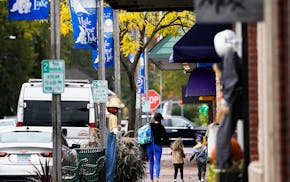The teens sit before Judge Susan Castro, some flanked by anxious relatives, others casual in jeans next to business-suited attorneys. The youths nod as Spanish translation seeps into their court-issued headphones.
In her small Fort Snelling courtroom, Castro offers no-nonsense rundowns of the situation in a gentle tone: "The government is asking me to order you deported because they think you arrived in this country illegally."
Earlier this year, at least 240 unaccompanied children from Central America arrived in Minnesota, placed here with relatives and other sponsors. Now, their cases are making their way through immigration court and putting the system for handling such cases to an unprecedented test.
Advocates for the youths have voiced concern about what they dub "the rocket docket," an effort to move their cases along swiftly. Nonprofits, law schools and private lawyers have rallied to provide legal services to the children who, like adults in immigration court, are not entitled to an attorney.
So far, Castro, who hears all the cases of unaccompanied minors, has granted kids extra time and put deportation proceedings on hold as attorneys file a flurry of asylum applications. Still, the children's prospects for staying are murky.
"This fast-tracking of cases is something we have never seen before," said John Keller of the nonprofit Immigrant Law Center. "We are in uncharted territory."
A surge in kids and families from Honduras, El Salvador and Guatemala this year has spurred an intense national debate amid stalled immigration reform efforts. Advocates say the children need protection from the gang violence wracking their countries, which have among the highest per capita murder rates. Others, including Republican members of Congress, argue young migrants are mainly lured by smugglers, who promise that children will be allowed to stay.
A top priority
On a recent Thursday morning, Castro presided over the initial hearings of a handful of children. She honored requests for more time — from an attorney who'd just taken a case and from children looking for attorneys — even as she imparted a sense of urgency.
"Just relax," Castro told the teens before walking them through the process. "We're just going to talk today."
Since 2012, minors and families with young children from Central America have been crossing the southern U.S. border in growing numbers. Before a recent dip in new arrivals, more than 68,000 children arrived without their parents since October 2013.
Based on interviews with 400 children, the United Nations High Commissioner for Refugees recently found 58 percent of unaccompanied minors appear to have legitimate claims for protection. Those children told of fleeing gang extortion or violence in their homes. Others said they were drawn by better opportunities or a chance of reuniting with family members.
Ricardo, a pseudonym, made the trip from El Salvador with the help of a smuggler this summer, when he was 17. He says gang members in his hometown beat him when he resisted joining up. They accused him of working with the police or a rival gang, he says. He feared for his life.
"The gangs have practically taken control of my country," he said in Spanish. "You don't feel free there. It's too dangerous."
Ricardo also said job opportunities in the United States beckoned. He is living with an aunt in Minnesota and working at a restaurant as his attorney, Kevin Heinz, prepares his asylum application.
In Minnesota's immigration court, special dockets for minors and families with children were created in late summer after the Obama administration gave these cases top priority, vowing those without legitimate claims to stay would be quickly deported.
Some attorneys say these hearings have pushed back asylum and other pending cases. They are also concerned the new process — with weeks, not months, between hearings — makes it harder to build trust with young clients.
Since 2008, unaccompanied migrants from countries other than Mexico and Canada have had a chance to appear before an immigration judge and to appeal directly to a U.S. Citizenship and Immigration Services, or USCIS, asylum office. Another option is to go to family or juvenile court to seek Special Immigrant Juvenile Status, or SIJS, a finding the child was abandoned or abused, before the case goes to USCIS.
In both cases, says Rebecca Scholtz of the nonprofit Mid-Minnesota Legal Aid, "Navigating the process without legal representation is nearly impossible, especially for a child." A Syracuse University analysis of a decade's worth of juvenile cases found that almost half of those with lawyers were allowed to stay. Nine in 10 without attorneys had to leave.
Earlier this year, local advocates teamed up to connect children and families with volunteer lawyers. At a recent training hosted by the nonprofit Advocates for Human Rights, about 60 volunteer attorneys showed up for a crash course on applying for asylum and SIJS. The partners have provided training for English language teachers in Minneapolis and for judges at Hennepin County Juvenile Court, where attorney Maggie Skelton says, "The judges really want to help these kids."
But the partners are not taking on all children's cases — partly because there are only so many volunteer attorneys and partly because not all cases are strong, said John Keller of the St. Paul-based Immigrant Law Center.
Murky prospects
On a recent Tuesday afternoon, Castro presided over second hearings for children. That day, most children, ages 12 to 18, showed up with attorneys who told the judge they were filing for asylum, SIJS or both. If they had already filed an application, Castro closed the immigration court case, in essence allowing the child to stay for now. A government attorney did not object.
Last on the juvenile docket, a teenage boy who crossed the border with a smuggler sat next to his father. Castro asked why they had returned without an attorney. The teen and his dad exchanged a glance.
"I want to go back to El Salvador," the boy said in Spanish.
"I am not in agreement with him leaving," the father hastened to say. "But he is kind of desperate."
He said the boy misses his mother and is having a hard time adjusting. The boy's mother had contacted the police in El Salvador earlier this year after gang members harassed him at school, but got no help, he said. What should he do? the father asked. Like his son, he acknowledged, he is in the country illegally. Castro told him she cannot offer advice, but they can go over the boy's options and give the family some time to decide what to do.
According to the Department of Justice, 142 unaccompanied minors received notices to appear before Castro between July 18, when the department started tracking such cases, through September. The department couldn't immediately give information on outcomes, but a spokeswoman said the court is "providing timely and fair adjudication of the cases."
Meanwhile, in the fiscal year ending Sept. 30, the Chicago Asylum Office received 246 unaccompanied minor asylum applications, including 41 from Minnesota. The office approved 30 percent of 93 such applications it processed that fiscal year.
Jessica Vaughan of the Center for Immigration Studies, a Washington, D.C.-based nonprofit that favors reduced immigration, has argued the United States needs to take steps to stem the flow of young migrants. Children who have reunited with parents shouldn't be entitled to a separate hearing, she says, arguing families are "using children as a wedge" to stay in the country.
While gang violence and poverty in Central America are serious issues, she said, "We can't solve these problems by relocating everyone here, and we can't keep incentivizing people to make this dangerous journey."
But attorneys say many children come with harrowing experiences that should make the government think twice before sending them back. Historically, immigration judges have balked at designating gang victims as a protected group. Attorneys hope the recent spate of asylum cases will change that.
Heinz, the attorney for Ricardo, is working to put together evidence backing up the boy's story, including an affidavit from Ricardo's mother who says gang members told her they would kill him if he returns. Ricardo is hopeful he'll get to stay. His goals: Work hard. Bring his family over from El Salvador.
Mila Koumpilova • 612-673-4781

Shop the curbs for free on 'Trash to Treasure Day' in White Bear Lake

Lacrosse lists: 21 top players and the school that's No. 1 for boys and girls

Will 'shotgun only' zone for deer in southern Minnesota be abolished?
One killed in head-on crash in Coon Rapids

